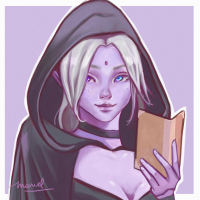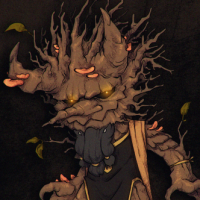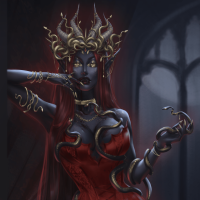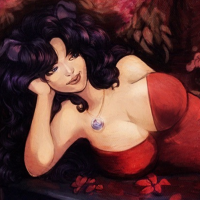Howdy, Stranger!
Categories
- 3.7K All Categories
- 3K The Midnight Age
- 757 Announce posts
- 125 Newbies
- 6 Class Guides
- 805 Harpy's Head Tavern
- 57 Echo Canyon
- 310 Self-Affirmations
- 163 Town Crier
- 135 The Exchange
- 167 Sparring Grounds
- Combat Guides
- 30 Combat Logs
- 188 Idea Box
- 9 Classleads
- 581 Roleplay Logs
- 107 Aetolia Development
- 5 The Void
- 744 Miscellaneous
- 9 Announcements
- 417 OOC Chat
- 217 Tech Talk
- 47 Scripts
Looking for more active discussion? Join our Discord at https://discord.gg/x2s7fY6
Bard Class Preview
 Ictinus
ProducerAdministrator, Immortal
Ictinus
ProducerAdministrator, Immortal
With recent events having set the future stage for its release, I am pleased to announce our next class: Bard! By now I'm sure plenty of you may have figured out that this is the new neutral class I promised in my end of year post, so we've decided to reveal some of the details of it in advance. Obviously the class is still in development, so some specifics may change between now and the release.
To begin with, here is what HELP BARD will look like!
- - -
Performers and assassins both, the Bards of Djeir operate openly out of their historical sanctuary, the Theater of Shadows. Their origins lay within the founding years of Undercity of Djeir, arising as a theater that showcased a gruesome - yet celebrated - blend of traditional drama and bloodsport. As the Undercity became embroiled within the throes of civil war following the death of Jy'rilia Garilicci, First Empress of Djeir, the Bards emerged as an unexpected power.
As all the major and minor noble houses warred for the throne, opportunities for public theater spread thin as the safety of a manor's walls grew more attractive. Still craving entertainment, the nobles began instead to invite the Theater to their estates to host their dramas for them and their allies. This provided many opportunities for a Bard to glean the secrets and plans of each house in order to sell the information to enemy factions. It did not take long for the first hired kills to follow that, starting the Bards' long, storied tradition in aristocratic assassination.
The Theater of Shadows grew powerful with alarming haste, eventually turning the nobility against them. As most houses established a tenuous ceasefire in order to slaughter the Theater, a fabled hero-bard would pen his name into the history books using a blood-stained falchion: Vascsce, of common birth. A talented actor and lead performer in the Theater, Vascsce was already owed fame, yet the events the eve before the Bards' planned demise would elevate him to legendary status.
Vascsce was lover to one Nueciale Garilicci, a minor noble within her family line with little prospects, that had accidentally become privy to her elders' scheme. Learning of the plans through her, Vascsce sought to bring an end to the civil war and secure a future for him and his colleagues. Humming a tune, he set off to the noble quarters and demonstrated his other talent.
One by one, Vascsce felled the heads of each house in a deadly performance, the intensity of his humming growing as he continued manor to manor, deeper into the noble quarters of the city. Resistance mounted to levels impossible for him to overcome and Vascsce bared all he had as the tune reached a fevered pitch. Prepared for death, he was stunned instead to see a path cleared before him as guard turned upon guard in defiance of reason. He had poured every inch of his being into his work during the frenzied encounter - including his soul - heightening his tune to magical levels to discover the art of Songcalling.
By the time the morrow had arrived, any noble that had a stronger claim to the throne than Nueciale was dead. She was coronated as Empress, ending the brutal civil war and solidifying the Garilicci family's position as the royal line. One of her first decrees was to grant Vascsce "attro ca pa'sa" - the Grace of the Empress - forgiving him of any crimes committed under Djeirani law. Her next ruling act was to establish a relationship with the Theater of Shadows, enacting an accord that lasts even today.
In short, the accord established that the sitting Empress of Djeir would be patron to the Theater of Shadows, and in exchange, the Empress would be immune to any assassination or attack from them. Should a Bard carry out an assassination, they must perform certain ceremonial steps during the deed in order to be able to invoke attro ca pa'sa and be forgiven of any crime. Failure to complete the proper ceremony would find them instead subject to Djeirani justice.
And so it remains a rare affair for a Bard to carry out a cloak and dagger assassination. Those still happen, when the need is high and pay is higher still, but it carries great risk to the Bard. Without a public audience to witness their kill, they would be beholden to honesty of the victim's family that the ceremony was completed properly. The theater of bloodsport was reborn under the royal accord and the Bards leaned into their performance. With each hired kill, a Bard tried to out-do prior spectacles to gain fame and notoriety, and to stretch towards the legend of Vascsce. And with each kill, the Djeirani cheered and reveled.
Defined by their three skills of Performance, Weaving and Songcalling, the Bards use each one for both theater and killing. With Performance, the Bards utilise their falchion with flair while finding ways to throw off an opponent's pace. Through Songcalling, a Bard can sing forth songs of legend to affect their audience in a powerful manner that can be beneficial or harmful. And finally, the traditional Djeirani art of Weaving is used to conjure items of light to pin a target down.
Bards first came to the spotlight of wider Sapience during the events of the Grand Tragedie in the month of Lleian, 501 MA. Ostensibly, the play was put on as an offering to Nalibhtavi, the Replete in an attempt to entertain and please the hedonist Goddess. In reality, the drama was the front for a spectacle assassination, masterminded by the Bard Teclah Neri against the two Ash'aji noblemen invited to act the lead roles. Hoping to create her best performance, she instead horribly miscalculated the reaction of the Elder Goddess. Rather than being pleased at the bloodshed, She grew outraged at the desecration of theater. In Her final acts of existence, the Full One slaughtered almost every single of the Djeirani Bards.
- - -
We'll have a bunch more of these snippets for you to feast on as we approach the release ready state!
I'm going to keep this thread locked so we can keep adding to it more easily, but I'll create a separate thread for comments and reactions.
To begin with, here is what HELP BARD will look like!
- - -
Performers and assassins both, the Bards of Djeir operate openly out of their historical sanctuary, the Theater of Shadows. Their origins lay within the founding years of Undercity of Djeir, arising as a theater that showcased a gruesome - yet celebrated - blend of traditional drama and bloodsport. As the Undercity became embroiled within the throes of civil war following the death of Jy'rilia Garilicci, First Empress of Djeir, the Bards emerged as an unexpected power.
As all the major and minor noble houses warred for the throne, opportunities for public theater spread thin as the safety of a manor's walls grew more attractive. Still craving entertainment, the nobles began instead to invite the Theater to their estates to host their dramas for them and their allies. This provided many opportunities for a Bard to glean the secrets and plans of each house in order to sell the information to enemy factions. It did not take long for the first hired kills to follow that, starting the Bards' long, storied tradition in aristocratic assassination.
The Theater of Shadows grew powerful with alarming haste, eventually turning the nobility against them. As most houses established a tenuous ceasefire in order to slaughter the Theater, a fabled hero-bard would pen his name into the history books using a blood-stained falchion: Vascsce, of common birth. A talented actor and lead performer in the Theater, Vascsce was already owed fame, yet the events the eve before the Bards' planned demise would elevate him to legendary status.
Vascsce was lover to one Nueciale Garilicci, a minor noble within her family line with little prospects, that had accidentally become privy to her elders' scheme. Learning of the plans through her, Vascsce sought to bring an end to the civil war and secure a future for him and his colleagues. Humming a tune, he set off to the noble quarters and demonstrated his other talent.
One by one, Vascsce felled the heads of each house in a deadly performance, the intensity of his humming growing as he continued manor to manor, deeper into the noble quarters of the city. Resistance mounted to levels impossible for him to overcome and Vascsce bared all he had as the tune reached a fevered pitch. Prepared for death, he was stunned instead to see a path cleared before him as guard turned upon guard in defiance of reason. He had poured every inch of his being into his work during the frenzied encounter - including his soul - heightening his tune to magical levels to discover the art of Songcalling.
By the time the morrow had arrived, any noble that had a stronger claim to the throne than Nueciale was dead. She was coronated as Empress, ending the brutal civil war and solidifying the Garilicci family's position as the royal line. One of her first decrees was to grant Vascsce "attro ca pa'sa" - the Grace of the Empress - forgiving him of any crimes committed under Djeirani law. Her next ruling act was to establish a relationship with the Theater of Shadows, enacting an accord that lasts even today.
In short, the accord established that the sitting Empress of Djeir would be patron to the Theater of Shadows, and in exchange, the Empress would be immune to any assassination or attack from them. Should a Bard carry out an assassination, they must perform certain ceremonial steps during the deed in order to be able to invoke attro ca pa'sa and be forgiven of any crime. Failure to complete the proper ceremony would find them instead subject to Djeirani justice.
And so it remains a rare affair for a Bard to carry out a cloak and dagger assassination. Those still happen, when the need is high and pay is higher still, but it carries great risk to the Bard. Without a public audience to witness their kill, they would be beholden to honesty of the victim's family that the ceremony was completed properly. The theater of bloodsport was reborn under the royal accord and the Bards leaned into their performance. With each hired kill, a Bard tried to out-do prior spectacles to gain fame and notoriety, and to stretch towards the legend of Vascsce. And with each kill, the Djeirani cheered and reveled.
Defined by their three skills of Performance, Weaving and Songcalling, the Bards use each one for both theater and killing. With Performance, the Bards utilise their falchion with flair while finding ways to throw off an opponent's pace. Through Songcalling, a Bard can sing forth songs of legend to affect their audience in a powerful manner that can be beneficial or harmful. And finally, the traditional Djeirani art of Weaving is used to conjure items of light to pin a target down.
Bards first came to the spotlight of wider Sapience during the events of the Grand Tragedie in the month of Lleian, 501 MA. Ostensibly, the play was put on as an offering to Nalibhtavi, the Replete in an attempt to entertain and please the hedonist Goddess. In reality, the drama was the front for a spectacle assassination, masterminded by the Bard Teclah Neri against the two Ash'aji noblemen invited to act the lead roles. Hoping to create her best performance, she instead horribly miscalculated the reaction of the Elder Goddess. Rather than being pleased at the bloodshed, She grew outraged at the desecration of theater. In Her final acts of existence, the Full One slaughtered almost every single of the Djeirani Bards.
- - -
We'll have a bunch more of these snippets for you to feast on as we approach the release ready state!
I'm going to keep this thread locked so we can keep adding to it more easily, but I'll create a separate thread for comments and reactions.
10
This discussion has been closed.








Comments
Performance is the physical-oriented skill of the Bard professional, an art through which one's own body becomes a conduit for dramatic effect and elaborate histrionics. Seamlessly blending guile and deceit with dexterous swordplay, expert performers are as much charming rogue as they are talented
actor.
Equally comfortable talking or brawling their way out of trouble, the Bard's agility and charisma both on and off the battlefield are unmatched. Too does the skill invite spectacle - ever is the Bard's work accompanied by a riveting flourish or dramatic fanfare, for there is no greater prize than a captive audience and their applause.
But after causing a spectacle, and invoking attro ca pa'sa, a Bard is often in need of a quick escape. Whether it be deflecting attackers onto someone else, or stealing a mount, there exist options both flashy and subtle. An expert performer can even blend seamlessly into an urban crowd, becoming indistinguishable from a common citizen at a cursory glance.
The art of Weaving is a crude but powerful technique, allowing the Bard to create and shape light, often into physical form. Whether it is used to conjure items on demand to debilitate a target, or create facsimiles of objects to use as props, it is a versatile skill well-suited to both theatrics and assassination.
Its ancient roots have a long, storied history in Djeirani culture, having existed since the first days of the underground race itself. Legend states that the Djeirani people were once spiders of Azdun - remnants of the Dark Empire - before being changed by the Lady Chakrasul, and the first hints of Weaving came from that ancestral form. As the spiders spun their large webs within the vast underground, they would imbue light along their strands, creating a luminous trap to enthrall and ensnare their prey. Though the Djeirani lost the ability to produce and spin silk in their modern forms, the art of drawing upon this light remained.
Today, there exist many forms of Weaving within the Undercity. Some are used to create the orbs of light that illuminate the vast cavern, while others might be familiar to adventurers in mention of Zaili and the net of revelation. The Bards have adapted the art of Weaving to their own needs, creating something distinct from these other forms. Some scholars have drawn links between Weaving and the skill of Enchantment, suspecting the two to have related histories, though this theory has yet to be proven.
Weaving can be identified by the trailing light following the caster's free hand during the spellcasting process, as they draw upon the ambient spirit around them. This is then spun into illusory objects, strands of illuminated thread taking simple forms that can be controlled freely by the Bard.
Experts in the craft are capable of creating far more complex objects, such as blades or collars. However, this masterwork is extremely taxing, requiring significantly more sources of conjured light to enact while causing the caster severe magical fatigue. The most elaborate Weaving spectacles often require multiple stages to complete, necessitating bigger sources to be created in preparation for a final, grand conjuration.
This magical fatigue or "dithering" can be mitigated through the use of onyx. Weavers commonly choose to wear bracelets and jewellery with gems of that black stone in order to gird themselves against exhaustion and carry out their works for more prolonged periods. In mythology, the Black Rose of Djeir is a powerful artifact of onyx, gifted to the city by Chakrasul at its founding. Said to be only useable by the bloodline of the Empress, the Black Rose allows her to spin powerful feats in order to protect her underground empire.
There is no weapon more powerful to a bard than their voice, this simple fact is embodied within the art of Songcalling. From the drunk fool to the shining diva, anybody is capable of singing, but only a bard is able to empower a song to transform the mundane into the mystical.
Yet it is no simple composition a bard will call upon; each storied song belongs to an illustrious collection known to the Theater of Shadows as The Eminent Ensemble. Most songs in the Ensemble share a common characteristic: they are memorable songs that have had a deep impact on many people. Indeed, most are ancient songs borne from legend and myth that have become widespread across the continent. Not every song that fits this description meets the criteria to join the Ensemble, and the phenomena remains beyond the understanding of the Theater even today.
It is only these songs of the Ensemble that a bard is capable of empowering. By using their soul as a catalyst, they cause a reverberation in their voice that entwines with a song's tune and heightens it to magical levels that can affect their audience. Through these songs, a proficient bard can even manipulate the emotions of an audience to their own end.
Many of the Ensemble's songs are known by different names, and even lyrics, in several corners of the continent but all versions of a song share the same tune and overall theme. It is these two facts that remain most important for the song, for a strong tune will easily evoke the memory one has of their own version of a song. Master bards are capable of utilising this effect to make a song their own, often changing the lyrics to a song to put their own creative flair upon it.
Taking this concept to its highest level, a bard is able to imbue a portion of their own soul into an instrument, allowing them to sing one song while playing a second.
We won't be showcasing any combat abilities as these are more likely to change before release, so without further ado, my pick of choice: MIMICRY from Performance! ---
Target: Audience.
Perform the song of mythics to another who is mutual allies with you. Upon hearing its uplifting notes, your soul will drift into and swap with the other, allowing you control over them, and them control over you.
Either person may use the command UNPOSSESS to end the control.
Disclaimer: As with the others, this ability is still in active development and may behave differently when it is live, but as of now, this is how it looks:
GOSSIP SPREAD (text)
A bard is ever-attuned to the local gossip, and when handled right it can be a weapon as deadly as any other. Through the careful sifting of gossip, bards learned the movements of the great houses of Djeir, and with a word or two in the right ear, they would draw their targets into the open.
You must be at least slightly tipsy in order to loosen your silver tongue, both allowing you to pick up gossip with more clarity than other people, and spread new gossip. Gossip spread in this way will be local to the current area, and last a lot shorter than natural gossip. Gossip can only be spread once every hour - any shorter than that and you risk being outed as the source.
Note that the [Gossip]: line is an admin alert which I included to show off the area limitation!
(As always, names, usages, everything is subject to change prior to release).
Dithering effect: 1
Conjure forth ordinary everyday objects. They can be a few things of choice, and will decay in a short amount of time.
Types:
Cup, chair, table, cane, rock, chest, soapbox, sword, pole, springboard, ladder, barrel, or fence.
THE TERMS OF THE THRONE
1. Empress Nueciale of House Garilicci, First of her Name, True Ruler of the Undercity of Djeir, hereafter referred to as THE EMPRESS, hereby lends her most right and royal patronage to the Theater of Shadows, hereafter referred to as THE BARDS.
2. As Patron, THE EMPRESS assents to the provision of support both financial and logistical to THE BARDS in commensurate execution of her most right and royal patronage in the undertaking of duties theatrical and fatal.
3. THE EMPRESS grants the right of attro ca pa'sa to any and all members of THE BARDS in order to properly discharge their duties in the art of assassination and murder without legal reprisal or punishment under the conditions of Da'ath Nievva, the CEREMONY OF THE ROSE, as outlined below.
4. This accord nullifies any and all prior accords.
4a. This accord is not subject to the whims of Djeirani successors ("THE THRONE") and may not be overturned or dissolved save in the case of breach or other violation by either party.
THE TERMS OF THE THEATER
1. On behalf of the Theater of Shadows ("THE BARDS"), Vascsce of THE COMMON FOLK, hereafter referred to as THE HIGH BARD, hereby agrees to the immediate cessation of hostilities against the Throne of Djeir and to recognise the Throne's immunity from future assassinations by their organisation.
2. THE BARDS agree to conduct Da'ath Nievva in order to avail themselves of attro ca pa'sa in the discharging of their contracts and adhere to the following procedures:
2a. The actor, hereafter known as THE BARD, must begin the CEREMONY OF THE ROSE by announcing themselves to the target prior to the commencement of any assassination attempt.
2b. Should greater than half a day pass without completion, the ceremony is failed.
2c. THE BARD must present a poisoned black rose to the intended recipient ("THE TARGET").
2d. In the case of aristocratic assassination, THE TARGET must be given the choice of a noble death and to deny the spectacle of the kill.
2e. In the event of THE TARGET accepting the rose, the assassination attempt is voided.
2f. Refusal of the rose is hereby acknowledged as confirmation that the assassination may continue.
2g. Upon successful execution, THE BARD must place the rose upon the body of THE TARGET, perform a sufficiently dramatic bow, and verbally invoke attro ca pa'sa.
2h. THE BARD must not return to The Theater until dawn of the following day. Returning prior to this shall forfeit the Empress's Grace.
2i. If the above criteria are met, THE BARD will face no legal or punitive repercussions for their action.
By royal decree and with the assent of all parties, this agreement is binding and perpetual.
Blend in with the crowd as one of the mundane, trying not to draw attention. While you are actively trying to be mundane, you will appear as a simple peasant. Should you be attacked, then the disguise is lost and you will be stunned. Should you have a better disguise on hand, you may utilize that in place of adopting a peasant-like appearance.
Act with care, as your disguise only works so long as you do not draw attention yourself - most actions will still show you for who you are. Only emotes and says will convey your disguise otherwise.
This ability will fool even guards, but keep in mind that if you perform an aggressive action, it will lose its effects at once.
Bards are performer-assassins, trained in the ancient traditions of Djeir's Theater of Shadows. They are a diverse and multi-dimensional profession, seamlessly blending physical dexterity and wit with both the mysterious art of light weaving and the ability to elicit powerful magical effects from their songs. Though Djeirani in origin and steeped in the Undercity's culture, training in the Bardic arts became available to Sapience in the Year XXX, following the profession's near-destruction by the hands of Nalibhtavi, the Replete, some time prior.
What is the Theater of Shadows?
Located deep within Djeir, the Theater is the historical sanctuary of the Bards, known for its entertaining blend of both traditional drama and blood sport. When the Undercity found itself embroiled in civil war, the Theater emerged as an unexpected political power, expanding their skills from mere entertainment and theatrics into the art of aristocratic assassination. So vast was the influence of the Theater in those days that it achieved what few had ever done before: uniting the noble houses of the Undercity against it.
It was a man known as Vascsce, a low-born commoner, who would ensure the Theater's continued existence into the modern era, slaughtering the heads of each house save for that of his beloved, Nueciale Garilicci. In so doing, Vascsce not only preserved the ways of the Bards and averted their eradication, but cleared the way for Nueciale to claim the Djeirani throne as Empress, ending the civil war and earning the right of attro ca pa'sa in a concordat that lasts until this very day.
What is the Concordat?
The Concordcat is a contract between the Theater of Shadows and the throne of Djeir. Its terms establish the Empress of Djeir as the Theater's Patron and affords the Bards the right of attro ca pa'sa - the Grace of the Empress. It is this royal assent that guarantees the Bards freedom from prosecution or punishment for their assassinations, effectively legalising the act provided certain conditions are met.
In exchange for this freedom, the Theater of Shadows agrees not to take contracts or writs on the throne of Djeir, providing immunity from the organisation's assassins.
Invoking attro ca pa'sa requires that the Ceremony of the Rose - known more commonly as Da'ath Nievva - be carried out prior to any assassination attempt. This elaborate ritual involves the presenting of a black rose to the intended target, whereupon they are given the choice whether to accept it (and in so doing, deny the spectacle of a true assassination) or refuse it, all but ensuring a dramatic and mesmerising assassination. Following the kill, the Bard must place the rose upon the target's corpse, bow, and verbally invoke the Empress's Grace.
Provided the Bard follows these conditions and does not return to the Theater until the following day, the assassination is a legal one, and they will not face consequences.
How are the powers of the class accessed?
Through Performance, a Bard hones their physical dexterity to its limits, allowing them to conduct elaborate acrobatic displays and utilise their own body as a weapon. It is this skill which forms the basis of many traditional Bardic activities: use of disguises, acting, charming others, and dramatic histrionics are all within the remit of Performance.
Weaving is an ancient Djeirani discipline that involves shaping light into illusory objects and magical effects. This draws on ambient spirit in a technique that has been passed down through generations of Djeirani history. Countless props are at the disposal of a skilled weaver, and their ability to manipulate light provides a myriad of advantages both on and off the battlefield.
Songcalling allows a Bard to use their voice as a weapon, empowering music to transform the mundane into the mystical. Each song of power belongs to an illustrious collection known as The Eminent Ensemble; these are invariably great ballads of legend and myth whose lyrics and melodies have impacted people across the ages. By using their soul as a catalyst, a skilled Bard is able to tap into this musical legendarium and manipulate the emotions of an audience with ease.
Visual style of the class:
In order to properly fulfil their obligations and invoke attro ca pa'sa, the Bard must work with dramatic flourish and elaborate effect. Despite the supposed mundane physicality of performance, a Bard's dexterous acrobatics and skilled swordplay are well-honed to provide entertainment and spectacle. Weaving ranges in intensity from pinpricks of light to great shows of illumination depending on the complexity of the act. Arguably its most distinguishable creation are the globes of bright light which orbit a victim, but falling stars are also a common sight.
Selection of one's instrument is an extremely personal choice for the Bard, requiring that they imbue a portion of their soul into it in order to both play and sing simultaneously. Such a bond makes the instrument a prominent feature in their ballads and tunes, and the hands of a master are a truly captivating sight to behold when they play.
Side effects of use:
Constant physical exertion has a profound effect on the body, and it is paramount that a Bard respects their limits, taking appropriate time to rest and to warm up prior to any particularly taxing endeavour. The risk of physical exhaustion and injury is intensified by the "dithering" effect that comes about from prolonged weaving - complex light-work is both extremely taxing and difficult, though its effects can be mitigated by wearing jewellery and accessories made from onyx.
How to roleplay the class:
Bards encompass a wide range of archetypes, including charming rogues, cunning swashbucklers, and lively brawlers. Rarely are any two alike given the vast platform for expression that theatrics and the dramatics art provide for. Murder is an omnipresent facet of even the most outwardly sophisticated societies; as such, a Bard adheres to no strict alignment or morality, choosing their own way. Essential, however, is a love of the dramatic and a fondness for stories, whether it be a grand saga delivered in royal chant or a bawdy tale of lust and love shared over the spit and sawdust of a seedy inn.
Dithering effect: 5
Requires a Globe upon the opponent.
By weaving light to penetrate your opponent's defences, you may steal one of them for your own benefit. The defence is chosen at random from those currently active on the target, and will expire after a set amount of time.
What is a globe, you ask? Wait and see!
While at a public tavern, pub, or inn that serves alcohol, you can choose to unwind there, refreshing your endurance and willpower somewhat. You will also become slightly tipsy, but such is the price to pay for comfort.
There is a somewhat long cooldown before you may unwind once more after using this ability.